英语语法学习:一般过去时与现在完成时的比较
区分英语中的现在完成时与一般过去式
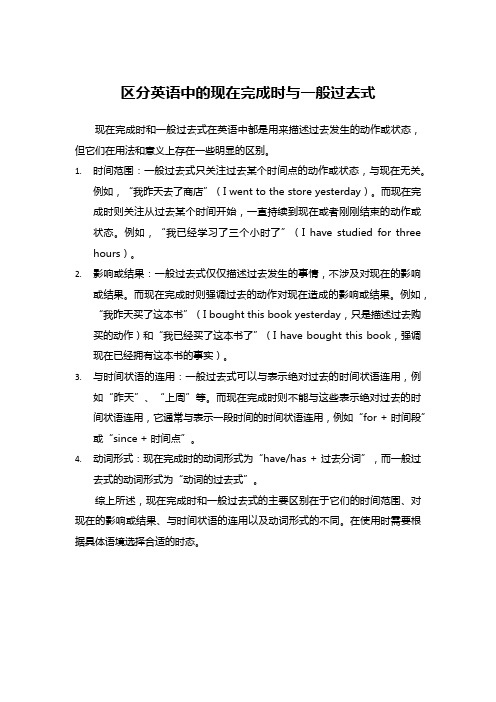
区分英语中的现在完成时与一般过去式
现在完成时和一般过去式在英语中都是用来描述过去发生的动作或状态,但它们在用法和意义上存在一些明显的区别。
1.时间范围:一般过去式只关注过去某个时间点的动作或状态,与现在无关。
例如,“我昨天去了商店”(I went to the store yesterday)。
而现在完成时则关注从过去某个时间开始,一直持续到现在或者刚刚结束的动作或状态。
例如,“我已经学习了三个小时了”(I have studied for three hours)。
2.影响或结果:一般过去式仅仅描述过去发生的事情,不涉及对现在的影响
或结果。
而现在完成时则强调过去的动作对现在造成的影响或结果。
例如,“我昨天买了这本书”(I bought this book yesterday,只是描述过去购买的动作)和“我已经买了这本书了”(I have bought this book,强调现在已经拥有这本书的事实)。
3.与时间状语的连用:一般过去式可以与表示绝对过去的时间状语连用,例
如“昨天”、“上周”等。
而现在完成时则不能与这些表示绝对过去的时间状语连用,它通常与表示一段时间的时间状语连用,例如“for + 时间段”
或“since + 时间点”。
4.动词形式:现在完成时的动词形式为“have/has + 过去分词”,而一般过
去式的动词形式为“动词的过去式”。
综上所述,现在完成时和一般过去式的主要区别在于它们的时间范围、对现在的影响或结果、与时间状语的连用以及动词形式的不同。
在使用时需要根据具体语境选择合适的时态。
现在完成时与一般过去时的区别例句
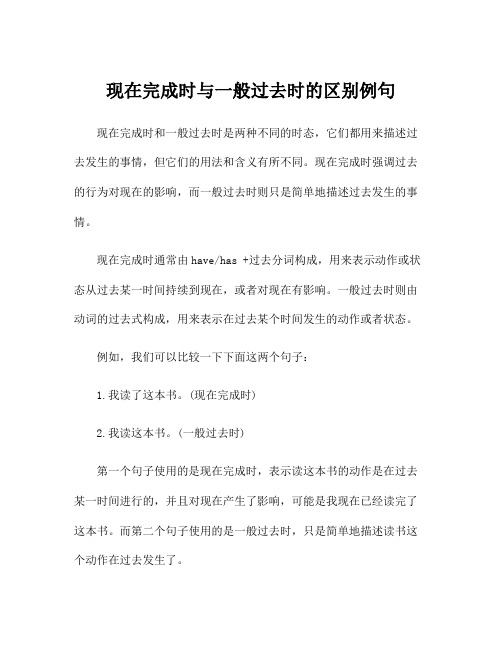
现在完成时与一般过去时的区别例句现在完成时和一般过去时是两种不同的时态,它们都用来描述过去发生的事情,但它们的用法和含义有所不同。
现在完成时强调过去的行为对现在的影响,而一般过去时则只是简单地描述过去发生的事情。
现在完成时通常由have/has +过去分词构成,用来表示动作或状态从过去某一时间持续到现在,或者对现在有影响。
一般过去时则由动词的过去式构成,用来表示在过去某个时间发生的动作或者状态。
例如,我们可以比较一下下面这两个句子:1.我读了这本书。
(现在完成时)2.我读这本书。
(一般过去时)第一个句子使用的是现在完成时,表示读这本书的动作是在过去某一时间进行的,并且对现在产生了影响,可能是我现在已经读完了这本书。
而第二个句子使用的是一般过去时,只是简单地描述读书这个动作在过去发生了。
现在完成时还可以用来表示过去发生的事情对现在产生的影响。
比如:1.我已经拿到了工作offer。
(现在完成时)2.我拿到了工作offer。
(一般过去时)在第一个句子中,使用的是现在完成时,表示我已经拿到了工作offer,并且现在可能已经开始工作了。
而第二个句子使用的是一般过去时,只是简单地表述了我在过去拿到了工作offer,但对现在没有影响。
现在完成时还有一个重要的用法就是描述过去发生的事情一直延续到现在。
比如:1.我从来没有去过中国。
(现在完成时)2.我从来没有去过中国。
(一般过去时)在第一个句子中,使用的是现在完成时,表示从过去到现在的某一时刻,我一直没有去过中国。
而第二个句子使用的是一般过去时,只是简单地表述了我过去没有去过中国,但不一定对现在有影响。
现在完成时和一般过去时的区别在于,现在完成时强调过去的行为对现在的影响,而一般过去时只是简单地描述过去发生的事情。
在实际使用中,需要根据具体的语境和要表达的含义选择使用哪种时态。
小学六年重要知识点现在完成时与一般过去时的区别

小学六年重要知识点现在完成时与一般过去时的区别在小学六年级的英语学习中,现在完成时和一般过去时是两个重要的时态。
虽然它们都表示过去的动作或状态,但是在用法和含义上存在一些区别。
下面将详细介绍现在完成时和一般过去时的区别。
一、现在完成时的用法现在完成时表示过去发生的动作或已完成的状态与现在的关系。
它通常与包括"have"或"has"的助动词连用,并且当前仍有相关的影响或结果。
1. 表示过去发生的动作或已完成的状态对现在造成的影响或结果:- I have finished my homework.(我已经完成了我的作业。
)(现在,我没有作业要做了。
)- She has lost her key.(她已经丢失了她的钥匙。
)(现在,她无法打开门。
)2. 表示过去开始的动作一直延续到现在(或现在仍在进行):- They have lived in this city for three years.(他们在这个城市已经住了三年了。
)(他们仍然住在这个城市。
)二、一般过去时的用法一般过去时表示过去发生的动作或状态,与现在没有直接关系,对现在没有影响或结果。
1. 表示过去发生的动作或状态:- I finished my homework yesterday.(我昨天完成了我的作业。
)- She lost her key last week.(她上周丢失了她的钥匙。
)2. 表示过去的习惯或经常性动作:- They always played soccer after school.(他们放学后总是踢足球。
)三、现在完成时与一般过去时的区别1. 时间表达上的差异:- 现在完成时通常使用含有"have"或"has"的助动词,并结合表示过去的时间状语,如"just", "already", "yet"等。
现在完成时和一般过去时的区别
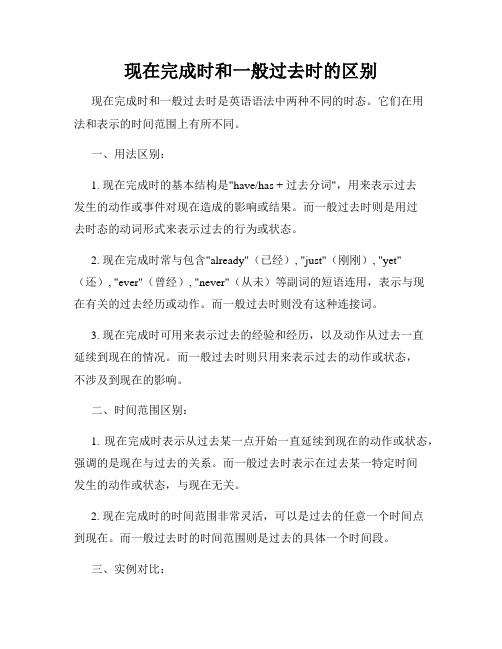
现在完成时和一般过去时的区别现在完成时和一般过去时是英语语法中两种不同的时态。
它们在用法和表示的时间范围上有所不同。
一、用法区别:1. 现在完成时的基本结构是"have/has + 过去分词",用来表示过去发生的动作或事件对现在造成的影响或结果。
而一般过去时则是用过去时态的动词形式来表示过去的行为或状态。
2. 现在完成时常与包含"already"(已经), "just"(刚刚), "yet"(还), "ever"(曾经), "never"(从未)等副词的短语连用,表示与现在有关的过去经历或动作。
而一般过去时则没有这种连接词。
3. 现在完成时可用来表示过去的经验和经历,以及动作从过去一直延续到现在的情况。
而一般过去时则只用来表示过去的动作或状态,不涉及到现在的影响。
二、时间范围区别:1. 现在完成时表示从过去某一点开始一直延续到现在的动作或状态,强调的是现在与过去的关系。
而一般过去时表示在过去某一特定时间发生的动作或状态,与现在无关。
2. 现在完成时的时间范围非常灵活,可以是过去的任意一个时间点到现在。
而一般过去时的时间范围则是过去的具体一个时间段。
三、实例对比:1. 现在完成时的例句:a) I have visited Paris three times.(我已经去过巴黎三次了。
)b) She has just finished her homework.(她刚刚完成了她的作业。
)c) Have you ever traveled to Japan?(你曾经去过日本吗?)上述例句表达的动作或经历与现在有关,时间范围是从过去到现在。
2. 一般过去时的例句:a) I visited Paris last year.(我去年去过巴黎。
)b) She finished her homework yesterday.(她昨天完成了她的作业。
太难懂?现在完成时与一般过去时的区别(初中家长收藏)
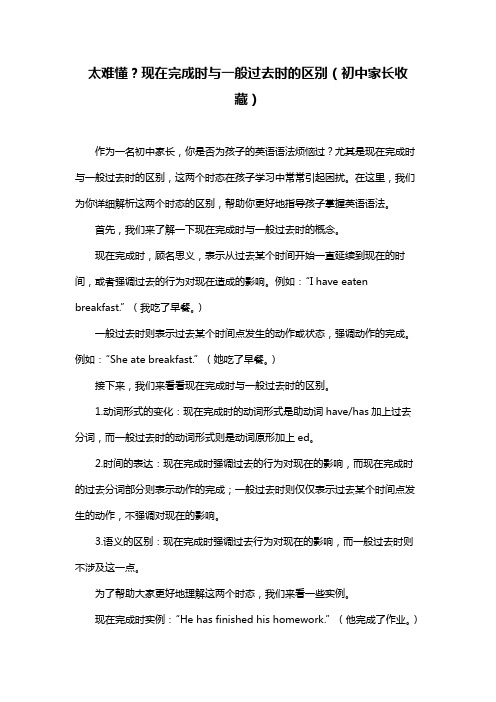
太难懂?现在完成时与一般过去时的区别(初中家长收藏)作为一名初中家长,你是否为孩子的英语语法烦恼过?尤其是现在完成时与一般过去时的区别,这两个时态在孩子学习中常常引起困扰。
在这里,我们为你详细解析这两个时态的区别,帮助你更好地指导孩子掌握英语语法。
首先,我们来了解一下现在完成时与一般过去时的概念。
现在完成时,顾名思义,表示从过去某个时间开始一直延续到现在的时间,或者强调过去的行为对现在造成的影响。
例如:“I have eaten breakfast.”(我吃了早餐。
)一般过去时则表示过去某个时间点发生的动作或状态,强调动作的完成。
例如:“She ate breakfast.”(她吃了早餐。
)接下来,我们来看看现在完成时与一般过去时的区别。
1.动词形式的变化:现在完成时的动词形式是助动词have/has加上过去分词,而一般过去时的动词形式则是动词原形加上ed。
2.时间的表达:现在完成时强调过去的行为对现在的影响,而现在完成时的过去分词部分则表示动作的完成;一般过去时则仅仅表示过去某个时间点发生的动作,不强调对现在的影响。
3.语义的区别:现在完成时强调过去行为对现在的影响,而一般过去时则不涉及这一点。
为了帮助大家更好地理解这两个时态,我们来看一些实例。
现在完成时实例:“He has finished his homework.”(他完成了作业。
)在这个例子中,动作“完成作业”从过去某个时间开始一直延续到现在,并且对现在有影响。
一般过去时实例:“She finished her homewo rk.”(她完成了作业。
)这个例子中,动作“完成作业”仅仅表示过去某个时间点发生的事情,不涉及现在的影响。
最后,我们来谈谈如何正确使用现在完成时与一般过去时。
1.观察动词时态:要根据动词的时态变化来判断是现在完成时还是一般过去时。
2.理解句子意义:在理解句子的过程中,要注意句子所表达的时间概念,判断是强调过去行为对现在的影响还是仅仅表示过去某个时间点发生的动作。
现在完成时与一般过去时的区别
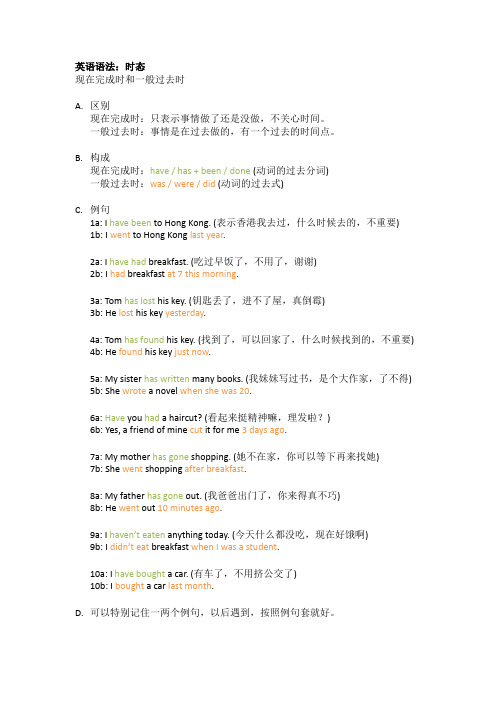
英语语法:时态现在完成时和一般过去时A.区别现在完成时:只表示事情做了还是没做,不关心时间。
一般过去时:事情是在过去做的,有一个过去的时间点。
B.构成现在完成时:have / has + been / done (动词的过去分词)一般过去时:was / were / did (动词的过去式)C.例句1a: I have been to Hong Kong. (表示香港我去过,什么时候去的,不重要) 1b: I went to Hong Kong last year.2a: I have had breakfast. (吃过早饭了,不用了,谢谢)2b: I had breakfast at 7 this morning.3a: Tom has lost his key. (钥匙丢了,进不了屋,真倒霉)3b: He lost his key yesterday.4a: Tom has found his key. (找到了,可以回家了,什么时候找到的,不重要) 4b: He found his key just now.5a: My sister has written many books. (我妹妹写过书,是个大作家,了不得) 5b: She wrote a novel when she was 20.6a: Have you had a haircut? (看起来挺精神嘛,理发啦?)6b: Yes, a friend of mine cut it for me 3 days ago.7a: My mother has gone shopping. (她不在家,你可以等下再来找她)7b: She went shopping after breakfast.8a: My father has gone out. (我爸爸出门了,你来得真不巧)8b: He went out 10 minutes ago.9a: I haven’t eaten anything today. (今天什么都没吃,现在好饿啊)9b: I didn’t eat breakfast when I was a student.10a: I have bought a car. (有车了,不用挤公交了)10b: I bought a car last month.D.可以特别记住一两个例句,以后遇到,按照例句套就好。
现在完成时与一般过去时的用法区别
现在完成时与一般过去时的用法区别现在完成时与一般过去时这两种时态是高中时态学习中的难点,也是重点。
现将他们的区别总结如下:现在完成时的用法有两种:1表示动作在过去发生到现在已经完成,但动作的结果对现在仍有影响。
如:Tom has just left。
2动作或状态从过去开始一直持续到现在,并有可能再持续下去,如:We have studied English for 5 years.而一般过去时只强调过去发生了某个动作,并不注重对现在的影响和结果,具体比较如下:一、有一个表示确定的过去时间状语时,就要用一般过去时:I saw the film last night.我昨天晚上看了这部电影When did you hear the news?你什么时候听到消息的?二、有一个表示包括现在时间在内的一段时间的状语时,多用现在完成时:He has learned a great deal since he became a college student.自他上大学以来,他学到了不少东西。
三、有一频度时间状语或不确定的时间状语时,多用现在完成时:I have often seen him these days.这些天来我常看到他。
Have you ever seen the film before?你以前看过这部电影吗?四、如果没有时间状语,要根据上下文来判断。
内容和意义有时也影响时态的应用。
如果考虑过去发生的事对现在的影响或结果,则用现在完成时,否则用一般过去时:What did you have for breakfast?你早饭吃些什么?Have you had your breakfast?你吃过早饭了吗?五、有时地点状语也会影响时态的应用:Have you bought an English book?你买了本英语书吗?Where did you buy it?你在哪里买的?六、有时还要看动词所表示的动作是否能在现在或将来重复进行,能重复者多用现在完成时,否则用过去时:Lei Feng visited the factory three times.这个工厂雷锋参观过三次。
现在完成时和一般过去时的比较
一. 现在完成时和一般过去式的区别:这两个时态都谈过去已经发生的事,主要差别是现在完成时表示的动作与现在有关系,或是对现在有影响,或谈现在以前这一段时间里发生的事,而一般过去时单纯谈过去的事,与现在没有练习,因此凡是有过去时间状语时,只能用一般过去时。
eg: I lived in a hostel for two years. (现在是下午或晚上)I lived in a hostel for two years。
(现在还是早上)二. Have gone to 与have been to 的区别Have gone to表示到某地去,因此人还在那里eg: The children have gone to play in the park。
Have been to表示到或来过某地eg: They’ve been to the cinema means that they went and have returned.三.由since引导的从句中的时态由since引导的从句一般用过去时,主句谓语用现在完成时eg: Great changes have taken place since I was there last time.We’ve been friends ever since we met at the party.四.It is the first/second/third time +sth +现在完成时eg: It’s the first time the painting has been display to the public.It’s the second time the team has lost this season.六.过去完成时过去完成时表示在过去某一时刻或动作之前已完成的动作,即过去的过去。
这个过去的时刻常用by, before等介词短语或一个时间状语从句来表示,也可以用一个表示过去的动作或上下文来表示。
英语现在完成时与一般过去时的区别
英语语法现在完成时与一般过去时的区别现在完成时的一个重要考点就是与一般过去时的区别,通过理解以下讲解和做相应的习题,你一定会掌握。
现在完成时与一般过去时的区别1.共同点:现在完成时和一般过去时都表示一个在过去完成的动作。
2.区别:①现在完成时强调的是与现在的关系,如对现在产生的结果或影响等,属于现在时范围,谈论的是现在的情况。
而一般过去时只表示动作在过去某一时刻发生,不表示和现在的关系,现在情况可能已发生变化。
Who opened the door? (“谁开的门?”只强调过去开门这一动作,门现在可能已关上。
)Who has opened the door? (“谁把门开了?”强调门现在依然还开着。
)②现在完成时不能与明确的过去时间状语连用,如:three days ago, last year, yesterday, last Sunday, in2008等等。
如句中有以上这些明确的过去时间状语,应用一般过去时。
再有,过去发生的一个动作,如现在情况已经发生的变化,也应用一般过去时。
☆特别提醒:如果这些过去时间状语前有since,表示“自过去某一时间一直延续到现在”,应用现在完成时。
He finished reading the book the day before yesterday.I put my ruler in my pencil-box, but I can’t find it now.My cousin has been in Nanjing since 2009.③现在完成时不与when引导的特殊疑问句连用,when后只用一般过去时表示已发生的动作。
但现在完成时可与where, why等疑问词连用。
如:Where have you been? (你去过哪里了?) --The train has left.--When did the train leave?④since引导的时间状语从句后面用一般过去时,只有前面的主句才用现在完成时。
英语语法:现在完成时与一般过去时的区别(1)
英语语法:现在完成时与一般过去时的区别(1)英语语法:现在完成时与一般过去时的区别(1)1. 动词形式be have do动词形式have beenhas beenhave hadhas hadhave workedhas worked3.现在完成时与一般过去时的区别(1)现在完成时强调过去发生的动作的结果和对目前的影响,而一般过去时强调动作发生的时间、地点、方式等,与现在没有联系。
比如:I have just had breakfast.我刚吃过早饭。
I had breakfast a moment ago.我是刚才吃的早饭。
The bell for class has already rung.1. — You are late again, Mike. ___ for more than half an hour.— I washeld up in a jam.A. I’dwaitedB. I’m waitingC. I’vewaitedD. I’ll wait2. Yousee, there is a big tree in front of my house that ___ some of the rooms rather dark.A. makesB. madeC. had madeD. was making参考答案:1-2: CA二、分析句子的语法结构,并译成中文。
1. You see,there is a big tree in front of my house that makes some of the rooms rather dark.2. Rising temperatures in the Arctic have slowed the circulation of the jet stream and other giant planetary winds,says the paper, which means high and low pressure fronts are getting stuck and weather is lessable to moderate itself.【The Guardian】。
- 1、下载文档前请自行甄别文档内容的完整性,平台不提供额外的编辑、内容补充、找答案等附加服务。
- 2、"仅部分预览"的文档,不可在线预览部分如存在完整性等问题,可反馈申请退款(可完整预览的文档不适用该条件!)。
- 3、如文档侵犯您的权益,请联系客服反馈,我们会尽快为您处理(人工客服工作时间:9:00-18:30)。
英语语法学习:一般过去时与现在完成时的
比较
:一般过去时与现在完成时之间又些什么是需要我们注意的点呢?我们应该怎么区分好它们之间的关系呢?下面我们一起看看这篇《一般过去时与现在完成时的比较》。
1)一般过去时表示过去某时发生的动作或单纯叙述过去的事情,强调动作;
现在完成时为过去发生的,强调过去的事情对现在的影响,强调的是影响。
2)一般过去时常与具体的时间状语连用,而现在完成时通常与模糊的时间状语连用,或无时间状语。
*一般过去时的时间状语:yesterday,last week,ago, in1980, in October, just now等,皆为具体的时间状语。
*现在完成时的时间状语:for,since, so far, ever, never, just, yet, till/until, up to now, in past years,always等,皆不确定的时间状语。
共同的时间状语:this morning, tonight, thisApril, now, already, recently, lately 等。
3)现在完成时可表示持续到现在的动作或状态,动词一般是延续性的,如live, teach,learn, work, study, know.。
一般过去时常用的非持续性动词有come,go, leave, start, die, finish, become, get married等。
例如:
I saw this film yesterday. (强调看的动作发生过了)
I have seen this film. (强调对现在的影响,电影的
内容已经知道了)
Why did you get up so early? (强调起床的动作已发生过了)Who hasnt handed in his paper? (强调有卷子未交,疑为不公平竞争)
He has been in the League for three years. (在团内的状态可延续)
He has been a League member for three years. (是团员的状态可持续)
句子中如有过去时的时间副词(如yesterday,last, week, in 1960)时,不能使用现在完成时,要用过去时。
(错)Tom has written a letter to his parents last night.
(对)Tom wrote a letter to his parents last night.
一般现在时代替现在完成时
1) 有些动词用一般现在时代替完成时,如hear, tell, learn, write , understand, forget, know, find , say,remember等。
例如:
I hear (= have heard) he will go to London.
我听说了他将去伦敦。
I forget (=haveforgotten) how old he is.
我忘了他多大了。
2) 用句型 It is since代替It has been since 。
例如:
It is (= has been) five years since we last met.
从我们上次见面以来,五年过去了。
公众号:英语语法学习
英语语法学习:一般过去时与现在完成时的比较。
